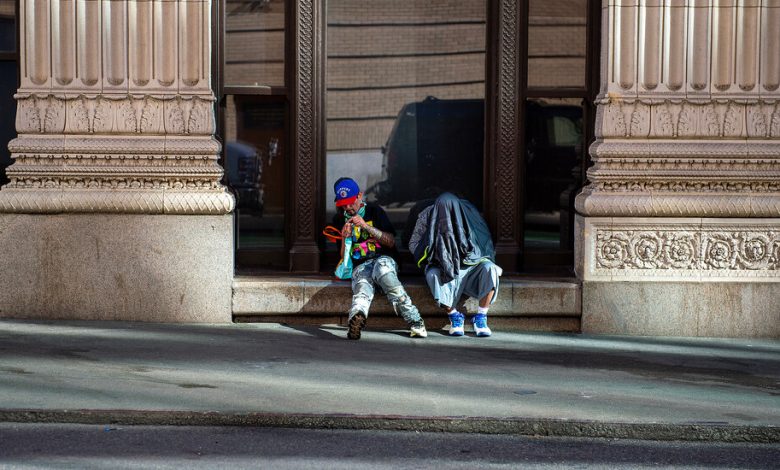The Hard-Drug Decriminalization Disaster

How soon is too soon to call a progressive and libertarian policy obsession a public policy fiasco? In the case of Oregon’s Drug Addiction Treatment and Recovery Act, better known as Measure 110, the moment can’t come soon enough.
In 2020, Oregon voters approved, with 58 percent in favor, a measure to decriminalize possession of small amounts of hard drugs such as cocaine, heroin and methamphetamine and establish a drug-treatment program funded by tax revenue from marijuana sales. Those caught with less than a gram of heroin or less than two grams of meth are issued the equivalent of a traffic ticket, with a $100 fine that can be waived by calling a treatment referral number and agreeing to participate in a health assessment.
Supporters of the measure called it a huge first step and a paradigm-shifting win that would bring down overdose rates, lessen the spread of disease, reduce racial inequities and make it easier for addicts to seek out treatment. The Drug Policy Alliance, which spent millions to help pass the measure, called it “the biggest blow to the drug war to date” and celebrated its supposed success in a slick video.
Now comes the reality check.
“On her walk to work at Forte Portland, a coffee shop and wine bar that she operates with her brother in the sunken lobby of a commercial building, Jennifer Myrle sidesteps needles, shattered glass and human feces,” The Times’s Jan Hoffman reported this week, alongside an extraordinary photo essay from the photographer Jordan Gale. “Often, she says, someone is passed out in front of the lobby’s door, blocking her entrance. The other day, a man lurched in, lay down on a Forte couch, stripped off his shirt and shoes and refused to leave.”
Other scenes the piece describes and depicts:
A woman who, according to Myrle, performed oral sex on a man at 11:30 in the morning on a block between Target and Nordstrom.
A police officer handing out toothless citations to addicts shooting up in public, sometimes, the officer said, on playgrounds.
A list of the reasons a fentanyl and meth addict named Noah Nethers likes Portland: “He can do drugs wherever he wants, and the cops no longer harass him. There are more dealers, scouting for fresh customers moving to paradise. That means drugs are plentiful and cheap.” (Not as idyllic: “Folks in nearby tents, high on meth, hit him with baseball bats.”)
What these anecdotes suggest, the data confirms. In 2019 there were 280 unintentional opioid overdose deaths in Oregon. In 2021 there were 745. In 2019 there were 413 shooting incidents in Portland. In 2022 there were 1,309. (Numbers have abated a bit this year.) Of the 4,000 drug use citations issued in Oregon during the first two years of Measure 110, The Economist found, only 40 people called the hotline and were interested in treatment. “It has cost taxpayers $7,000 a call,” The Economist reported. The number of people living on the street in Multnomah County, which includes Portland, rose by 29 percent from January 2022 to January 2023.
In their defense, proponents of Measure 110 — support for which has plummeted — argue that decriminalization is still in its early days and funds for harm reduction, housing and other services have been slow to arrive. Some also point to Portugal, which decriminalized hard drugs for personal use in 2001 to great fanfare, as an example of what decriminalization has achieved over time.
So how is that going?
Not so well, as suggested in a report last month by The Washington Post’s Anthony Faiola and Catarina Fernandes Martins. The number of adults using drugs in Portugal shot up to 12.8 percent in 2022, from 7.8 percent the year the policy began. Overdose rates in Lisbon have doubled in the last four years. The police blame drugs for a rise in crime. In the city of Porto, drug use is contributing to a steep decline in the quality of urban life. The number of people obtaining treatment fell by nearly 70 percent between 2015 and 2021. The dissuasion commissions that were supposed to encourage people to seek help no longer play much of a role.
Here, too, defenders of the system point to funding shortfalls, especially for treatment. But the sticky fact that proponents of decriminalization rarely confront is that addicts are not merely sick people trying to get well, like cancer sufferers in need of chemotherapy. They are people who often will do just about anything to get high, however irrational, self-destructive or, in some cases, criminal their behavior becomes. Addiction may be a disease, but it’s also a lifestyle — one that decriminalization does a lot to facilitate. It’s easier to get high wherever and however you want when the cops are powerless to stop you.
Some readers of this column will respond that, whatever the problems in Portland or Portugal, we don’t want to return to the cost, violence and apparent fruitlessness of the old war on drugs. But that depends on whether the price of endless war exceeds or falls short of the price of permanent surrender.
To judge by the catastrophe unfolding in Oregon, I’d think twice before replicating this reckless experiment elsewhere.
The Times is committed to publishing a diversity of letters to the editor. We’d like to hear what you think about this or any of our articles. Here are some tips. And here’s our email: [email protected].
Follow The New York Times Opinion section on Facebook, Twitter (@NYTopinion) and Instagram.




